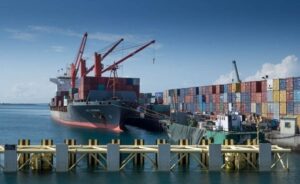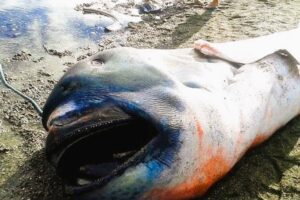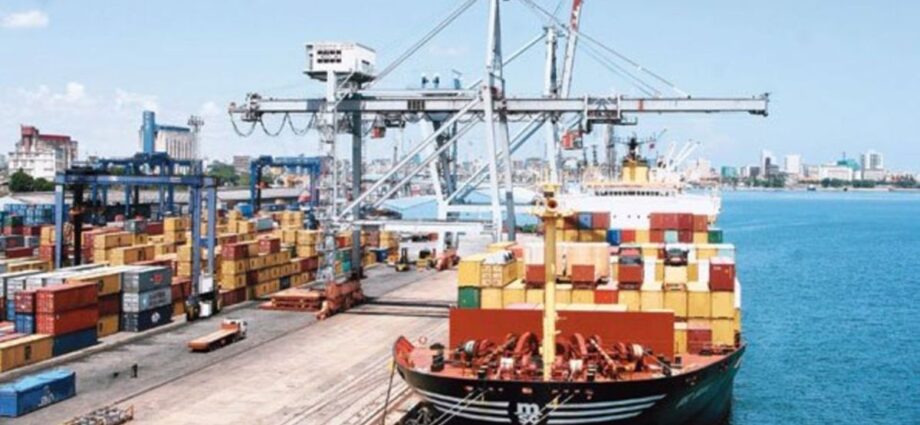Ports have long been integral to Africa’s connectivity with the rest of the world. Yet over the last 15 years, a new stage in maritime infrastructure planning and development has begun. Between 2004 and 2019, over US$50 billion was spent on this infrastructure – roughly 13 times more than was spent between 1990 and 2004.
Ports reflect more than simple economic imperatives. They are crucial in creating and reinforcing social, political, and cultural systems. Infrastructure can be a useful lens to understand what particular groups in society value and how political elites aim to structure the social order. Indeed, port investment makes visible the linkages and disconnections between different agendas (those of leaders, global capital and civil society).
In a recently published paper, we explored two key questions about port investment and construction. What explains the massive increase? And what does this tell us about the nature of economic growth and political change across Africa?
We argue that the latest phase of port infrastructure development – the “ports race” – is shaped by (and simultaneously shapes) three Africa-specific macro trends.
The first is reliance on the large scale export of natural resources (“extractivism”).
The second is an embrace of state-led development strategies that privilege large scale infrastructure.
Third is the repackaging of narratives that link economic growth and global connectivity. Elites do this to bolster their domestic power and legitimise processes that are often socially or environmentally destructive.
In essence, the ports race is the result of both new alliances between African political elites and global economic circumstances that favour large-scale infrastructure building. These may be drying up post-COVID-19, however.
Fashioning the ports race
African countries have long relied on primary commodity exports. This system, which began during the colonial period, largely continues today. The majority of African economies are still set up around two production systems: the export of oil and minerals, or the export of tropical agricultural products (there are a few exceptions, including Morocco).
The ports race is symptomatic of a new pattern in national development.
African politicians are aiming to use the export of unprocessed resources and commodities to develop pockets of domestic value-addition in certain strategic industries. This strategy has become ubiquitous under the umbrella of “resource-led development”. Yet it creates the conditions for the continued plunder of African resources and for hugely environmentally or socially damaging processes.
A good example is Ghana’s US$2 billion bauxite-for-infrastructure agreement with Sinohydro, a Chinese multinational. Bauxite will be processed domestically for export markets. But at least part of the Atewa forest reserve, where the bauxite is located, will be destroyed in the mining process.
The need for greater export capacity also drives port expansion projects across Africa. Increasingly, states are seeking to attract capital and bolster their legitimacy at home and abroad by creating “safe spaces” for investment.
For example, Djibouti has attracted over $4 billion for infrastructure development in the past 10 years alone. Yet, this has done little to reduce Djibouti’s poverty rates or improve employment levels. Instead, new infrastructure has served to gather international support for Ismail Omar Guelleh’s repressive regime, as corporate and state actors present the port of Djibouti as a secure regional pivot for transhipments.
The domestic stability needed to attract capital to Djibouti was realised through the erosion of press freedoms, harsh crackdowns on dissent and non-competitive elections. It is in the alliance between the interests of local political elites and foreign capital that the developmental effects of port projects are defined.
Due to rising levels of indebtedness and growing competition among African states to attract foreign investment, this is not a lasting solution.
The economic and political consequences of costly infrastructure projects falling short in delivering growth and development can be disastrous. For instance, loans might not be repaid, or funding could be directed away from projects with greater potential social impacts.
The ports race is a “risky business”. How, then, do African elites legitimise port development domestically?
They do it by associating infrastructure with modernity and connectivity. In essence, they create an idea of a future with high-tech port operations, smoothly paved roads and uninterrupted flows of goods.
Infrastructural visions are closely connected to extractivism and state-led development. They speak of “unlocking” the potential of specific African regions by connecting them with global trade and capital flows. And they portray domestic peripheries as “unproductive” and in need of infrastructure development.
Conclusion
Considering the number of large-scale maritime infrastructure projects currently under way in Africa, we view the ports race as an ongoing process. Major world events like COVID-19 and the Russian invasion of Ukraine could have an impact on it, though.
Not all port projects are harmful for growth and development. The developmental effects of ports and other maritime infrastructure are complex and varied. They depend on local factors and whether projects are tied to overarching plans.
For some countries, port construction or expansion may enhance the implementation of industrial policy frameworks by reducing transport costs and inefficiencies. Yet this is not a given. Moreover, construction of multiple ports in the same region attempting to gain the status of transhipment or gateway “hubs” means that some will certainly fall short. There will be severe political and economic consequences.
Ricardo Reboredo is an Assistant Professor, Metropolitan University Prague, whereas Elisa Gambino Fellow, Department of International Relations, London School of Economics and Political Science
Share this news
This Year’s Most Read News Stories

Tanzania: Samia Hands Over NBC’s 354m/ – Crop Insurance Compensation to Farmers Affected By Hailstorms
President Samia Suluhu Hassan, has handed over a cheque of 354m/- from the National Bank of Commerce (NBC) as compensation to tobacco farmers, who were affected by hailstorms during the previous farming season in various regions across the country.
Handing over the cheque in Dodoma, the compensation is part of the crop insurance service provided by NBC in collaboration with the National Insurance Corporation (NIC).
Furthermore, President Samia has also handed over health insurance coverage to members of the Lindi Mwambao Cooperative Union based in Lindi Region, through the Farmers’ Health Insurance service provided by the bank in partnership with Assurance Insurance Company.
While visiting the bank’s pavilion at the Nanenane Agricultural Exhibition and being received and briefed by the bank’s Managing Director, Mr. Theobald Sabi, she said: “This crop insurance is one of the crucial solutions in ensuring farmers have a reliable income, without fear of challenges such as natural disasters, including hailstorms.
“I call upon all farmers in the country to make the best use of this important opportunity by accessing these kinds of insurance services. I also highly commend NBC and all the stakeholders participating in this programme.”
Elaborating further on the crop insurance service, the Minister of Agriculture, Hussein Bashe, stated that it will help to recover the loss farmers incurred, especially in various calamities beyond their control.
Citing them as floods, fires, and hailstorms, which have significantly affected the well-being of farmers and caused some to be reluctant to invest in the crucial sector, Mr Bashe added: “However, our President, this step by NBC is just the beginning, as this is the second year since they started offering this service, and the results are already visible.

Sign up for free AllAfrica Newsletters
Get the latest in African news delivered straight to your inbox
“As the government, we promise to continue supporting the wider implementation of this service, with the goal of ensuring that this crop insurance service reaches more farmers.”
ALSO READ: NBC participates in TFF 2023/24 awards, promises to enhance competition
On his part, Mr Sabi said that the farmers who benefited from the compensations are from 23 primary cooperative unions in the regions of Shinyanga, Geita, Tabora, Mbeya, Katavi, and Kigoma.
He added: “In addition to these insurance services, as a bank, through this exhibition, we have continued with our programme of providing financial education and various banking opportunities to farmers, alongside offering them various loans, including loans for agricultural equipment, particularly tractors, to eligible farmers.:
At the NBC booth, President Samia also had the opportunity to be briefed on the various services offered by the bank to the farmers namely crop insurance and health insurance services.
There, the President had the chance to speak with some of the beneficiaries of the services, including the Vice-Chairman of the Lindi Mwambao Primary Cooperative Union, Mr. Hassan Mnumbe, whose union has been provided with a health insurance card from the bank.
Source: allafrica.com

Zanzibar: Containers and dhows carrying alcohol stuck at Malindi Port
ZMMI, Scotch Store and One Stop Company have filed contempt of court case against Nicholas Eshalin, the chief executive officer of the Zanzibar Multipurpose TerminalContinue Reading

Rare megamouth shark found in Zanzibar for the first time – why so little is known about it
The recent sighting was only the sixth time a megamouth had ever been found off the coast of Africa.Continue Reading











